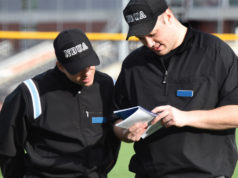“Leading up” has become a common mantra in American business. Many have read the work of University of Pennsylvania professor Michael Useem, who argues that if people are too intimidated or too reluctant to help their leaders lead, their leaders will fail. In the world of officiating that translates to, “The crew will fail.”
We all have a responsibility when we take the field or the court to use all reasonable means to get the call right. But what happens when the new crew member is a rookie? Or one who blew an inadvertent whistle on the previous play? What happens if the lead official is an intimidating force? What then? Are we still willing to take the necessary steps to ensure the proper call?
As a leadership professor I see it often — subordinates in the workplace who, usually for fear of sanction, fail to speak up and challenge their bosses. Sometimes the fear of speaking up occurs because individuals aren’t exactly sure if they have it right.
Sometimes it’s simply an overbearing boss.
It’s probably happened to most of us. We think we saw something different than someone on our crew. The ball touched the line. A hand broke the cylinder. The batter made a full swing. And as hard as we try not to “fish in someone else’s pond,” sometimes our angle, our positioning, or just plain fate places us such that we actually see the play differently. Now it’s gut-check time.
Officiating up can occur in one of two environments: during the play on the field or court or during crew discussions when the ball is dead. On the field is tough because it may involve stopping action. For example, a head linesman in a football game sees a back judge miss a fair catch signal. The player signaled, caught the ball, started running
anyway and was 40 yards downfield before a chagrined defense stopped his progress.
Between plays gives one a bit more time but can still be tough because the willingness of crew members to question calls is based on the leadership skill of the head official. Has he or she built an environment where this discussion is encouraged? If our ultimate goal
is to get the call right shouldn’t that be the standard of practice?
Here are five guidelines for officiating up.
1. Know your stuff.
There is no excuse for lack of preparation. Some associations require weekly case reviews and regular study, even after the season is under way. Regardless of what the association requires, it is everyone’s responsibility to be good stewards of the game. You don’t have much to offer your crew without a solid understanding of the fouls, penalties and rules of the game. And don’t let your preparation be limited to the season or the weeks immediately preceding the first game. It’s fine to take some time off at the end of a grueling schedule to recharge but keep yourself on a regular study schedule even when the ball isn’t in play.
2. If you don’t do it, who will?
Fans? Well, maybe. A few years ago a fan watching on television called Augusta National
and informed the officials at the Masters that Tiger Woods had violated a rule when dropping the ball. OK, that’s not likely to happen in many of our games. But seriously, who will step up? Officials are responsible for protecting the sanctity of the game. There will always be judgment calls, but clearly incorrect application of game rules is a different
matter. It gets to the heart and soul of the game itself. Make the call.
3. When in doubt, ask.
The worst officials are the ones who think they know all the rules. The second worst are those who let them get away with it. We all know officials like that. They speak with tremendous authority, typically with a few nonverbal cues thrown in to artificially inflate their opinion. The best officials are those who know their limits and recognize when they need help. Don’t make your pride the reason for a bad decision by the crew.
4. Create the environment.
It is, hands down, the lead official’s responsibility to build the culture on a crew — and it begins in the pregame. What does your entry into the locker room say about you — especially if your association mixes crews each week? Do you introduce yourself, remember names or engage in any meaningful level? Do you welcome dissent? Do you build an environment of mutual learning and common goals, or do you only speak with the more experienced officials on the crew, leaving the rookies to the side? If your crew members are afraid to officiate up, it’s probably your fault.
5. Remember the goal.
By attending some officiating conferences meetings and reading popular literature one might come away with the impression that the end-goal of officiating is a playoff assignment or an invitation to the next level of competition. Nothing is further from the truth. Our final product as officials is a properly officiated game, where participants compete fairly and safely regardless of the sport and regardless of the level. The only way that occurs is when the crew environment is one where there is open, honest and clear communication.
Officiating up is not about ingratiating yourself with your assigner or lead official. It’s also not about being an ultra-picky annoyance who looks for flaws on the crew or undermines someone’s authority. And it’s certainly not about abandoning good judgment or slowing down the game. Officiating up, when used properly, can enable a crew to grow into better officials while at the same time calling a tighter and more accurate game.
What's Your Call? Leave a Comment:
Note: This article is archival in nature. Rules, interpretations, mechanics, philosophies and other information may or may not be correct for the current year.
This article is the copyright of ©Referee Enterprises, Inc., and may not be republished in whole or in part online, in print or in any capacity without expressed written permission from Referee. The article is made available for educational use by individuals.


















